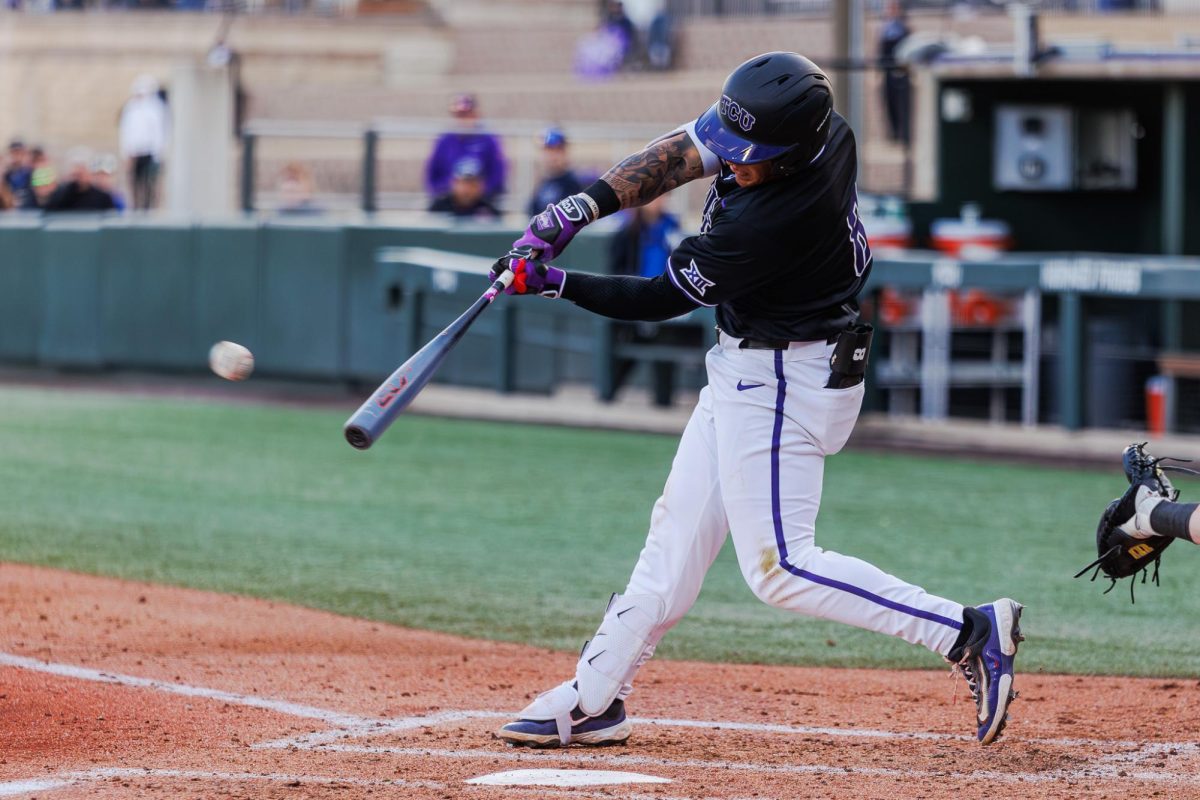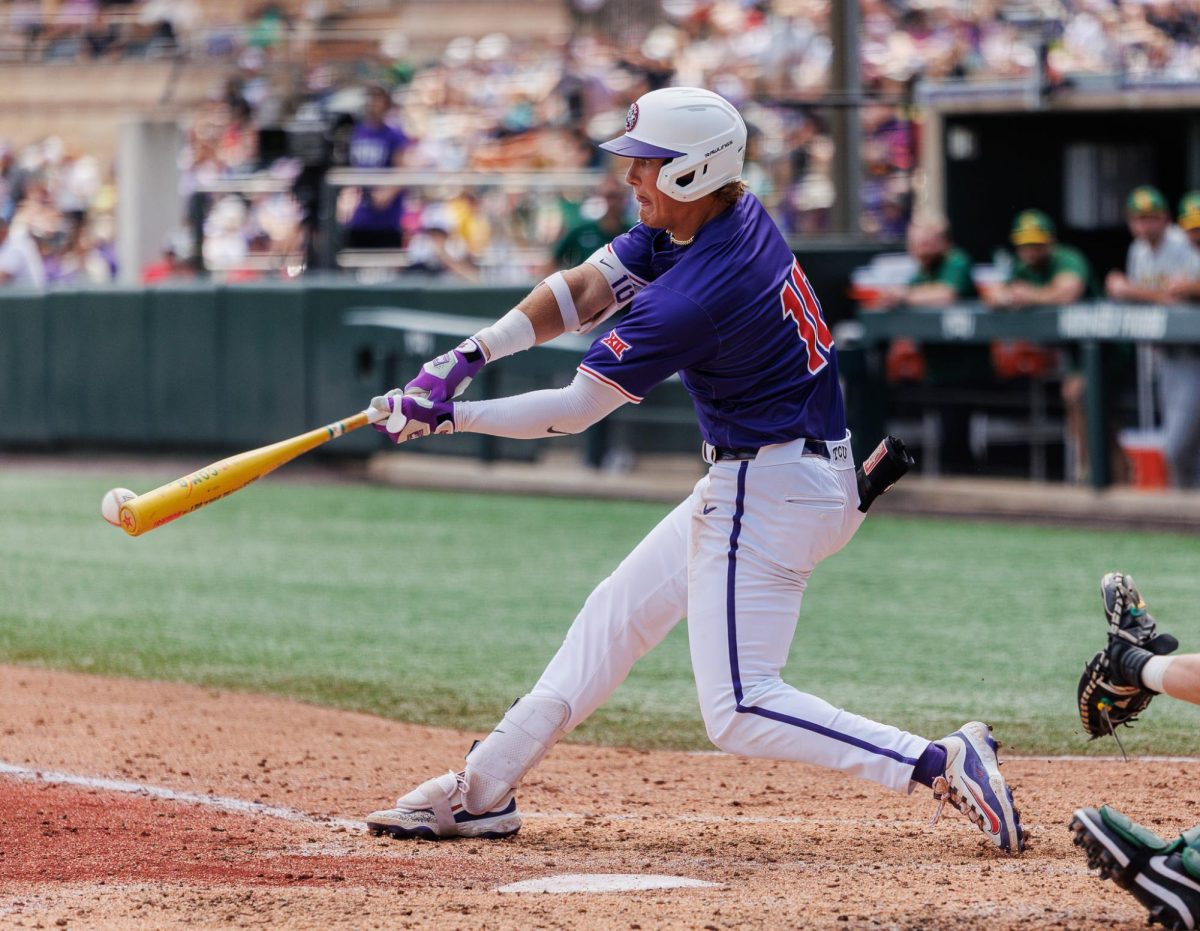What the TCU baseball team will lose in graduating players, it will gain in experienced freshmen and newcomers with potential next season.
The team ended its season on Saturday night with a 4-1 loss to UCLA in Game two of the NCAA Super Regional.
Despite getting swept by the Bruins, the Horned Frogs finished the season 40-22 and made it to their third Super Regional in the past four years. TCU reeled off four straight elimination-game victories to win the College Station Regional last week, including a 28-run outburst over Dayton and back-to-back wins against Ole Miss.
Let’s take a glance at what the Frogs will look like next year as they enter the Big 12:
Key Returners: RHP Andrew Mitchell, RHP Stefan Crichton, RHP Preston Morrison, LHP Brandon Finnegan, 1B Kevin Cron, 2B Derek Odell, OF/DH Jerrick Suiter, 3B Jantzen Witte, SS Keaton Jones, RP Justin Scharf, RP Kevin Allen.
One of the benefits of TCU head coach Jim Schlossnagle having to play so many freshmen this season is that those freshmen will be returning next year with loads of experience. Let’s take a look at the Frogs’ top returning position players:
1) Kevin Cron – Cron, a 2011 third round MLB draft pick, set an Arizona state record for home runs (27) as a senior in high school and was expected to bring some of that power to Fort Worth as a true freshman this year. A back injury quelled a bit of that power, but Cron continued to hit the ball well, finishing the season with a team-high .338 batting average and six home runs, four of which came in the postseason. Cron should be a lethal run producer next year, likely batting out of the three or four spot in the batting order.
2) Jantzen Witte – Injuries kept Witte out of the lineup early in the season, but once he returned – he produced, finishing the year with a .315 batting average and three home runs. He’ll be a steady part of the Frogs’ offense again next year, batting in the top half of the lineup. His biggest impact could be on the field, as the lone senior in an infield that will likely have three sophomore starters. That’ll sort of be a carry-over of his role this year, anchoring the TCU infield, which a majority of the time had three freshmen starting.
3) Derek Odell – Odell’s season turned around with two swings of the bat on May 1 against Oklahoma. Odell, hitting below .200 before the game, came in as a pinch hitter in the eighth inning with the Frogs trailing 3-1. He then lined a 100 mph Damien Magnifico fastball into centerfield, starting a rally that would tie the game. Odell finished what he started in the ninth, driving in Brance Rivera with a single to left field to give TCU a 4-3 win.
From that game on, Odell caught fire, finishing the year batting .276 and four home runs. During that stretch — the month of May and into the NCAA tournament — Odell showed the type of bat speed and ability at the plate that earned him back-to-back all-state honors his junior and senior years of high school and made him a 42nd round draft pick of the Boston Red Sox last year.
4) Jerrick Suiter – Suiter arguably was the Frogs’ first half MVP, playing multiple positions, including right field, designated hitter and pitcher. His playing time tapered off toward the end of the year, but the true freshman filled in for Brance Rivera as he battled early-season injuries and provided TCU with two midweek spot starts and four relief appearances, throwing 10 innings and giving up four earned runs. And he hit .310 at the plate.
Suiter is athletic. He’s big and strong with the versatility to play multiple positions. No surprise from a guy who was a three-sport star as an Indiana high-schooler, walked onto the football team, before getting injured, and, according to some close to the baseball program, could have had a shot to walk onto the basketball team if he wanted to.
5) Keaton Jones – Jones, also a true freshman, was probably the Frogs’ most underrated player this year, at least in the infield, where he starred at shortstop, committing just 12 errors. Not impressive enough? Consider this: Taylor Featherston, the three-time all-Mountain West selection who also made the 2010 College World Series all-tournament team, committed 27 errors at shortstop as a junior last year and 27 his freshman year.
Jones is a bit undersized and only hit .166, but he’ll get bigger and stronger and the hitting will come. In the meantime, the Frogs will have a steady infield anchor at a glove-heavy position who doesn’t just make plays on balls right at him but has impressive range, too. Pretty sure that’s a waiting game Schlossnagle is willing to play.
The Frogs’ top four starters are all returning, including first team all-American Preston Morrison and right-hander Andrew Mitchell, who hit 96 mph on the radar gun against UCLA Saturday night.
With that in mind, let’s take a glance at what TCU’s starting rotation and bullpen should look like next year:
1) Preston Morrison – Morrison did two things better this year than any other TCU pitcher: 1) Lived in the strike zone and 2) mixed up speeds.
Subsequently, the true freshman went 9-2 with a 2.08 ERA, was named the Mountain West Pitcher of the Year and earned third team all-American honors. And he did it with a fastball that rarely went more than 80 miles an hour.
Morrison, who throws from a three-quarter angle, but doesn’t drop his elbow like some side-armed throwers, is as close to a sure thing on the mound as there is in college baseball, where metal bats tend to out-power pitchers.
2) Andrew Mitchell – Speed. Speed, speed, speed. Mitchell has plenty of it, routinely reaching the mid-90s with his fastball. That’s how he ended up with 101 strikeouts in 77 innings pitched, but that’s also perhaps why he struggled at times, losing control of that fastball and walking a team-high 46 batters. Still, a 5-3 record with a 3.74 ERA isn’t terrible, especially with Mitchell’s stuff.
3) Stefan Crichton – Crichton, who was primarily a reliever as a freshman in 2011, quietly went 9-2 with a 3.41 ERA, perhaps his best performance coming against No. 1 seed Texas A&M in the College Station elimination game went threw a complete game, giving up just two runs on six hits.
Crichton keeps it between 89-92 miles an hour, not having as electric stuff as Mitchell but staying more in control – he walked just 18 batters in 95 innings this year. It should be a toss up between him and Mitchell for the opening day starting job.
4) Brandon Finnegan – Finnegan, just a true freshman this season, has the best stuff on the team. No way around that. He brings it 91-94 mph from the left side, has a cut fastball that moves away from right-handed hitters and in at the knees of lefties and a curveball that’s buckling for either side.
Finnegan finished just 4-5 but had a 3.47 ERA and impressive performances against Texas A&M at home and Oklahoma on the road. He needs a bit of polishing, though, which he gradually started to get as the season progressed and he learned how to grasp a better handle on his stuff.
Expect him to have a solid grab on the midweek starting job, that is, of course, if Schlossnagle doesn’t pull him into the bullpen, where he has the stuff to possibly become a late inning/closer-type guy.
Newcomer to Watch
Mitchell Traver – Traver, a 6-foot-7, 240 pound right-hander from Houston, is a powerful thrower, hitting 95 mph as a senior at Houston Christian High School this year and routinely keeping it in the low-90s. Traver, the 26th best prospect in the country according to ESPN.com, turned down offers from power programs such as Vanderbilt, LSU and Oklahoma to sign with the Frogs. Traver was a 39th round draft pick by his hometown Astros, but he’ll likely be at TCU in the fall, giving the Frogs another right-hander to throw into the mix.
Key Losses: OF Jason Coats, OF Brance Rivera, C Josh Elander
Jason Coats – One of the more underrated aspects of the Frogs’ Super Regional run was that they did it without Coats, arguably their best hitter and undoubtedly their most experienced player.
Coats, the all-time school leader in doubles, set the school record for most hits in a season as a sophomore during TCU’s 2010 College World Series run. When he went down with a torn ACL the week before the Mountain West Tournament, the Frogs, already inconsistent offensively, looked as if getting out of a region might not be possible. Well, TCU exploded at the plate without Coats, but that doesn’t mean it’ll be that easy next year.
Josh Elander – Elander was the Frogs’ primary power threat, batting .314 with 11 home runs, four of which came in the postseason. That’ll be gone, and so will his presence behind the plate, which coordinated a pitching staff featuring seven newcomers – five freshmen and two junior college transfers.
Brance Rivera — Rivera’s final season as a Frog likely wasn’t what he or the TCU coaching staff had hoped for, as the senior hit just .229 with 26 RBI. Still, that shouldn’t – and won’t – take away from what Rivera meant to the TCU clubhouse. Rivera truly was a leader, especially a veteran one, like Coats and Elander, on a team full of freshmen and sophomores.




